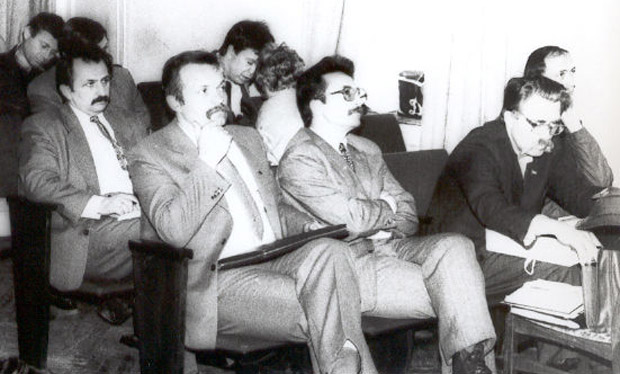Ukrainian Helsinki Association
Ukrainian Helsinki Association [Українська Гельсінська спілка; Ukrainska Helsinska spilka]. The Ukrainian Helsinki Association (UHA) was founded in 1988 on the initiative of Viacheslav Chornovil and with the support of many other dissidents and former political prisoners, some of whom had been members of the Ukrainian Helsinki Group (UHG). Like the UHG, the UHA stressed the importance of human rights. Unlike the UHG and almost all informal public organizations created in Ukraine in the late 1980s, however, the UHA placed a strong emphasis on achieving political goals. This included the promotion of democratic ideals, opposition to the Communist Party (the so-called neformaly), and genuine sovereignty for Ukraine.
The founding documents of the UHA were prepared by Viacheslav Chornovil, as well as Mykhailo Horyn and Bohdan Horyn, in April–May 1988. The Ukraïns’kyi visnyk was to be the UHA’s organ, and Levko Lukianenko, then still serving his term of exile, was offered, in absentia, the position of first head of the UHA. Lukianenko, who accepted the offer, was chosen because he had been a founding member of the UHG, had a legal education and, as a long-time political prisoner, was well known to many former dissidents. The creation of the UHA was formally announced at a large public meeting in Lviv on 7 July 1988, and branches of the organization were soon founded throughout Ukraine. In line with these developments, the External Representation of the UHG was renamed the External Representation of the UHA, headed by Mykola Rudenko.
Viacheslav Chornovil hoped to use the UHA as a vehicle for his political ambitions, and initially considered Lukianenko to be a largely symbolic figurehead. Chornovil’s expectation, however, that the UHA would become the nucleus of a large-scale, decentralized, non-party ‘national front’ structure like Sajudis in Lithuania was undermined by the creation in 1989 of the Sajudis-like Popular Movement of Ukraine (Rukh), which adopted some of the UHA’s organizational strategies. Levko Lukianenko’s competing plan, that the UHA become a centralized political party, gained momentum after he returned to Ukraine in early 1989, and at the constituent assembly of the UHA on 29–30 April 1990 the UHA was transformed into the Ukrainian Republican party, headed by Lukianenko.
Although it existed for only two years, the UHA and its members played a significant role in effectively mobilizing, in the late 1980s, much of the largely passive population in Soviet Ukraine, at the time a reactionary backwater dominated by a highly conservative CPU apparatus. Led by determined former dissidents and political prisoners who were committed to major changes in the status quo, the UHA strongly supported and often initiated the creation of other informal organizations such as the Ukrainian Language Society, the Green World ecological association, the Vasyl Stus ‘Memorial’ Society, etc. The activities of these organizations, as well as UHA support for a wide range of local political initiatives, provided much of the impetus for the democratization of society during the crucial period immediately preceding Ukraine’s independence.
As for the original human rights focus of the UHG and, to a lesser extent, the UHA, it was later revived in the form of the Ukrainian Helsinki Human Rights Union (UHHRU), founded by 15 public human rights organizations on 1 April 2004. The UHHRU’s Supervisory Board has consistently included prominent members of the original UHG and UHA.
BIBLIOGRAPHY
Horyn', Bohdan et al. (eds.) Ukrains'ka Hel'sins'ka Spilka 1988-1990 rr. u svitlynakh i dokumentakh (Kyiv 2009)
Lukianenko, Levko. Do istorii Ukrains'koi Hel'syns'koi Spilky (Kyiv 2010)
Shevchenko, Oles' (ed.) Ukrains'ka Hel'sins'ka Spilka u spohadakh i dokumentakh (Kyiv 2012)
Ivan Jaworsky
[This article was written in 2021.]

